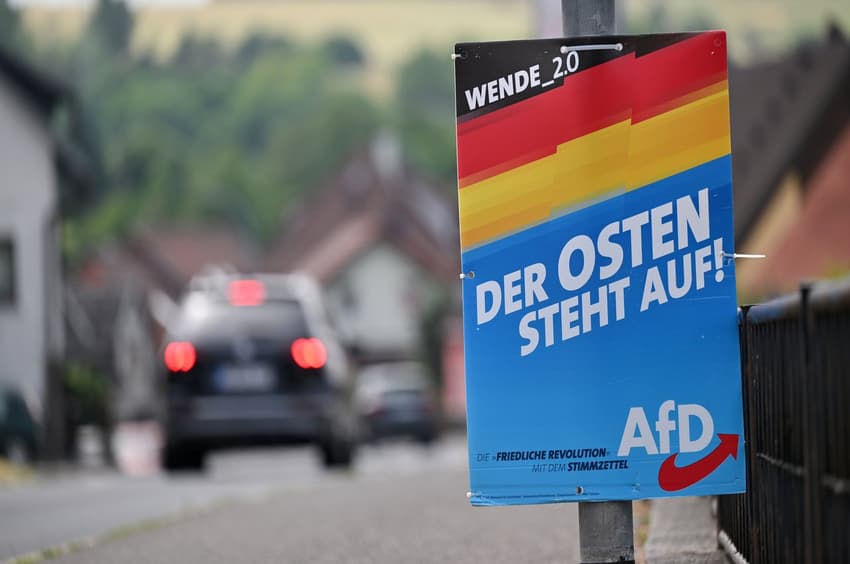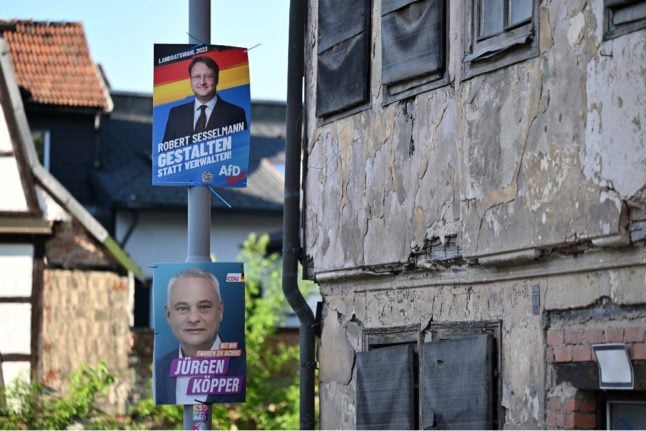Why did east Germans vote for far-right AfD in historic election?

Angry voters where Germany's
far-right AfD party won its first district election over the weekend say they
were out to punish the political establishment in Europe's top economy.
Speaking to AFP in the ex-communist town of Sonneberg, residents said government officials had long failed to take their mounting concerns over inflation and immigration seriously.
Ingo Schreurs, 58, said he hoped the AfD's new district administrator Robert Sesselmann would "give voice to the worries and fears and outrage of a lot of citizens".
Blaming Berlin for "destructive economic policies", Schreurs said a highly controversial energy policy reform, for example, had left locals "afraid that we won't be able to heat our homes this winter".
On a sunny summer's day in Sonneberg, the neat storefronts, blossoming parks and pleasant cafe terraces offer little hint of the political earthquake that has just struck.
READ ALSO: Why the far-right AfD's victory in an east German district is so significant
'Watershed moment'
Holger Müller, 49, said he "no longer saw any Germans" when he drove at night through Sonneberg, nestled on a hillside and famous for more than a century throughout Germany for its toy industry. He hopes the AfD will "stop the flow of foreigners".
Sesselmann, a lawyer and regional lawmaker, on Sunday captured 52.8 percent of the vote in a closely watched run-off election.
He beat his conservative rival Jürgen Köpper, who had won the endorsement of all the mainstream parties in a bid to block an AfD victory.

Campaign posters for Robert Sesselmann (AfD) and opponent Jürgen Köpper (CDU) in Sonneberg. Photo: picture alliance/dpa | Martin Schutt
The news the AfD would be running its first district council, albeit in a small constituency of just 57,000, struck like a bombshell.
Public broadcaster ARD called it a "watershed moment" while the top-selling newspaper Bild called it a "vote in anger" and the leftist daily Tageszeitung expressed "shock" at the outcome.
The head of the Central Council of Jews in Germany, Josef Schuster, compared the victory to a "dam break" that "democratic political forces in this country must not simply accept".
Far from just a one-off coup in a remote, thinly populated district, the AfD's triumph came after weeks of surging poll numbers at the national level.
An INSA institute survey Monday by Bild showed the extreme right party with more than 20.5 percent, ahead of Chancellor Olaf Scholz's ruling Social Democrats with 19.5 percent, its coalition partners the Greens (13.5 percent) and the pro-business FDP (6.5 percent).
Only the centre-right Christian Democrats had a better showing, at 26.5 percent.
The AfD is polling even better in the former communist East German states of Thuringia, Brandenburg and Saxony, which will see regional elections next year where the party is hoping to score even bigger breakthroughs.
In Sonneberg, Birgit Hillmer, 61, said she was "deeply ashamed" that her hometown had given the party a boost, blaming the community's past under communist rulers.
"I find it really terrible and embarrassing -- we're doing very well in this district," she said.
"People here grew up in a dictatorship and were marked by the dictatorship. Democracy means freedom and freedom means responsibility but people have shirked their responsibility here."
'Just the beginning'
The AfD was founded in 2013 as an anti-euro outfit before morphing into an anti-Islam, anti-immigration party, harnessing a backlash against then chancellor Angela Merkel's welcoming stance toward refugees.
It stunned the political establishment when it took around 13 percent of votes in the 2017 general elections, catapulting nearly 100 lawmakers into the German parliament.
The AfD slid to around 10 percent in the 2021 federal election.
In Germany, where coalition governments are the norm, mainstream parties have always ruled out forming an alliance with the AfD.
But news magazine Der Spiegel called the party's win in Sonneberg "the result of a collective failure" of the political class, pointing to persistent squabbling in Scholz's coalition and the conservative opposition "pouring oil on the fire with populist rhetoric".
After the Sonneberg success, the AfD's co-chairman Tino Chrupalla saw the wind at the party's back.
"This is just the beginning," he tweeted.
Comments
See Also
Speaking to AFP in the ex-communist town of Sonneberg, residents said government officials had long failed to take their mounting concerns over inflation and immigration seriously.
Ingo Schreurs, 58, said he hoped the AfD's new district administrator Robert Sesselmann would "give voice to the worries and fears and outrage of a lot of citizens".
Blaming Berlin for "destructive economic policies", Schreurs said a highly controversial energy policy reform, for example, had left locals "afraid that we won't be able to heat our homes this winter".
On a sunny summer's day in Sonneberg, the neat storefronts, blossoming parks and pleasant cafe terraces offer little hint of the political earthquake that has just struck.
READ ALSO: Why the far-right AfD's victory in an east German district is so significant
'Watershed moment'
Holger Müller, 49, said he "no longer saw any Germans" when he drove at night through Sonneberg, nestled on a hillside and famous for more than a century throughout Germany for its toy industry. He hopes the AfD will "stop the flow of foreigners".
Sesselmann, a lawyer and regional lawmaker, on Sunday captured 52.8 percent of the vote in a closely watched run-off election.
He beat his conservative rival Jürgen Köpper, who had won the endorsement of all the mainstream parties in a bid to block an AfD victory.

The news the AfD would be running its first district council, albeit in a small constituency of just 57,000, struck like a bombshell.
Public broadcaster ARD called it a "watershed moment" while the top-selling newspaper Bild called it a "vote in anger" and the leftist daily Tageszeitung expressed "shock" at the outcome.
The head of the Central Council of Jews in Germany, Josef Schuster, compared the victory to a "dam break" that "democratic political forces in this country must not simply accept".
Far from just a one-off coup in a remote, thinly populated district, the AfD's triumph came after weeks of surging poll numbers at the national level.
An INSA institute survey Monday by Bild showed the extreme right party with more than 20.5 percent, ahead of Chancellor Olaf Scholz's ruling Social Democrats with 19.5 percent, its coalition partners the Greens (13.5 percent) and the pro-business FDP (6.5 percent).
Only the centre-right Christian Democrats had a better showing, at 26.5 percent.
The AfD is polling even better in the former communist East German states of Thuringia, Brandenburg and Saxony, which will see regional elections next year where the party is hoping to score even bigger breakthroughs.
In Sonneberg, Birgit Hillmer, 61, said she was "deeply ashamed" that her hometown had given the party a boost, blaming the community's past under communist rulers.
"I find it really terrible and embarrassing -- we're doing very well in this district," she said.
"People here grew up in a dictatorship and were marked by the dictatorship. Democracy means freedom and freedom means responsibility but people have shirked their responsibility here."
'Just the beginning'
The AfD was founded in 2013 as an anti-euro outfit before morphing into an anti-Islam, anti-immigration party, harnessing a backlash against then chancellor Angela Merkel's welcoming stance toward refugees.
It stunned the political establishment when it took around 13 percent of votes in the 2017 general elections, catapulting nearly 100 lawmakers into the German parliament.
The AfD slid to around 10 percent in the 2021 federal election.
In Germany, where coalition governments are the norm, mainstream parties have always ruled out forming an alliance with the AfD.
But news magazine Der Spiegel called the party's win in Sonneberg "the result of a collective failure" of the political class, pointing to persistent squabbling in Scholz's coalition and the conservative opposition "pouring oil on the fire with populist rhetoric".
After the Sonneberg success, the AfD's co-chairman Tino Chrupalla saw the wind at the party's back.
"This is just the beginning," he tweeted.
Join the conversation in our comments section below. Share your own views and experience and if you have a question or suggestion for our journalists then email us at [email protected].
Please keep comments civil, constructive and on topic – and make sure to read our terms of use before getting involved.
Please log in here to leave a comment.